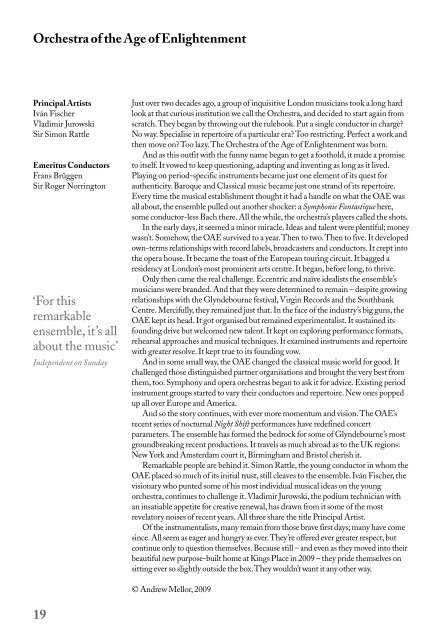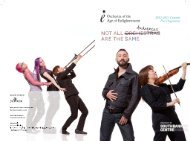Beethoven's Missa Solemnis - Orchestra of the Age of Enlightenment
Beethoven's Missa Solemnis - Orchestra of the Age of Enlightenment
Beethoven's Missa Solemnis - Orchestra of the Age of Enlightenment
Create successful ePaper yourself
Turn your PDF publications into a flip-book with our unique Google optimized e-Paper software.
<strong>Orchestra</strong> <strong>of</strong> <strong>the</strong> <strong>Age</strong> <strong>of</strong> <strong>Enlightenment</strong><br />
Principal Artists<br />
Iván Fischer<br />
Vladimir Jurowski<br />
Sir Simon Rattle<br />
Emeritus Conductors<br />
Frans Brüggen<br />
Sir Roger Norrington<br />
‘For this<br />
remarkable<br />
ensemble, it’s all<br />
about <strong>the</strong> music’<br />
Independent on Sunday<br />
19<br />
Just over two decades ago, a group <strong>of</strong> inquisitive London musicians took a long hard<br />
look at that curious institution we call <strong>the</strong> <strong>Orchestra</strong>, and decided to start again from<br />
scratch. They began by throwing out <strong>the</strong> rulebook. Put a single conductor in charge?<br />
No way. Specialise in repertoire <strong>of</strong> a particular era? Too restricting. Perfect a work and<br />
<strong>the</strong>n move on? Too lazy. The <strong>Orchestra</strong> <strong>of</strong> <strong>the</strong> <strong>Age</strong> <strong>of</strong> <strong>Enlightenment</strong> was born.<br />
And as this outfit with <strong>the</strong> funny name began to get a foothold, it made a promise<br />
to itself. It vowed to keep questioning, adapting and inventing as long as it lived.<br />
Playing on period-specific instruments became just one element <strong>of</strong> its quest for<br />
au<strong>the</strong>nticity. Baroque and Classical music became just one strand <strong>of</strong> its repertoire.<br />
Every time <strong>the</strong> musical establishment thought it had a handle on what <strong>the</strong> OAE was<br />
all about, <strong>the</strong> ensemble pulled out ano<strong>the</strong>r shocker: a Symphonie Fantastique here,<br />
some conductor-less Bach <strong>the</strong>re. All <strong>the</strong> while, <strong>the</strong> orchestra’s players called <strong>the</strong> shots.<br />
In <strong>the</strong> early days, it seemed a minor miracle. Ideas and talent were plentiful; money<br />
wasn’t. Somehow, <strong>the</strong> OAE survived to a year. Then to two. Then to five. It developed<br />
own-terms relationships with record labels, broadcasters and conductors. It crept into<br />
<strong>the</strong> opera house. It became <strong>the</strong> toast <strong>of</strong> <strong>the</strong> European touring circuit. It bagged a<br />
residency at London’s most prominent arts centre. It began, before long, to thrive.<br />
Only <strong>the</strong>n came <strong>the</strong> real challenge. Eccentric and naïve idealists <strong>the</strong> ensemble’s<br />
musicians were branded. And that <strong>the</strong>y were determined to remain – despite growing<br />
relationships with <strong>the</strong> Glyndebourne festival, Virgin Records and <strong>the</strong> Southbank<br />
Centre. Mercifully, <strong>the</strong>y remained just that. In <strong>the</strong> face <strong>of</strong> <strong>the</strong> industry’s big guns, <strong>the</strong><br />
OAE kept its head. It got organised but remained experimentalist. It sustained its<br />
founding drive but welcomed new talent. It kept on exploring performance formats,<br />
rehearsal approaches and musical techniques. It examined instruments and repertoire<br />
with greater resolve. It kept true to its founding vow.<br />
And in some small way, <strong>the</strong> OAE changed <strong>the</strong> classical music world for good. It<br />
challenged those distinguished partner organisations and brought <strong>the</strong> very best from<br />
<strong>the</strong>m, too. Symphony and opera orchestras began to ask it for advice. Existing period<br />
instrument groups started to vary <strong>the</strong>ir conductors and repertoire. New ones popped<br />
up all over Europe and America.<br />
And so <strong>the</strong> story continues, with ever more momentum and vision. The OAE’s<br />
recent series <strong>of</strong> nocturnal Night Shift performances have redefined concert<br />
parameters. The ensemble has formed <strong>the</strong> bedrock for some <strong>of</strong> Glyndebourne’s most<br />
groundbreaking recent productions. It travels as much abroad as to <strong>the</strong> UK regions:<br />
New York and Amsterdam court it, Birmingham and Bristol cherish it.<br />
Remarkable people are behind it. Simon Rattle, <strong>the</strong> young conductor in whom <strong>the</strong><br />
OAE placed so much <strong>of</strong> its initial trust, still cleaves to <strong>the</strong> ensemble. Iván Fischer, <strong>the</strong><br />
visionary who punted some <strong>of</strong> his most individual musical ideas on <strong>the</strong> young<br />
orchestra, continues to challenge it. Vladimir Jurowski, <strong>the</strong> podium technician with<br />
an insatiable appetite for creative renewal, has drawn from it some <strong>of</strong> <strong>the</strong> most<br />
revelatory noises <strong>of</strong> recent years. All three share <strong>the</strong> title Principal Artist.<br />
Of <strong>the</strong> instrumentalists, many remain from those brave first days; many have come<br />
since. All seem as eager and hungry as ever. They’re <strong>of</strong>fered ever greater respect, but<br />
continue only to question <strong>the</strong>mselves. Because still – and even as <strong>the</strong>y moved into <strong>the</strong>ir<br />
beautiful new purpose-built home at Kings Place in 2009 – <strong>the</strong>y pride <strong>the</strong>mselves on<br />
sitting ever so slightly outside <strong>the</strong> box. They wouldn’t want it any o<strong>the</strong>r way.<br />
© Andrew Mellor, 2009



